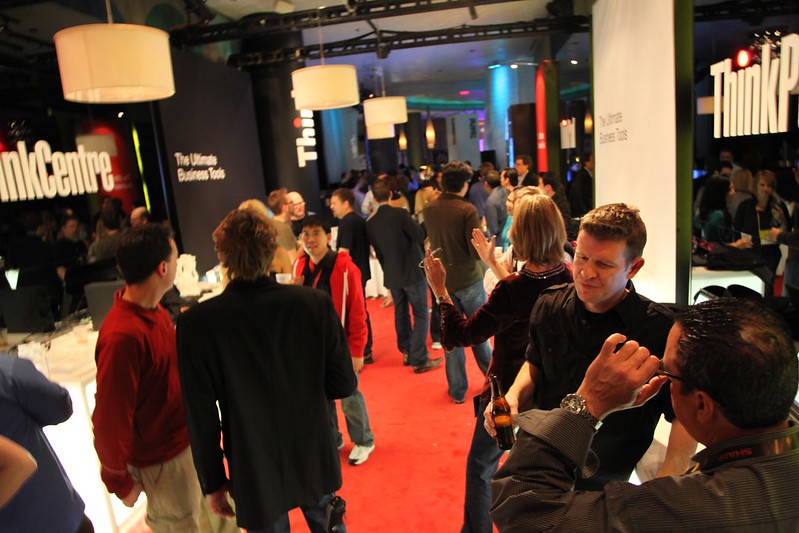Social Business Isn’t Dead, It’s…
 Here at IBM Connect 2014 in Orlando this week I’ve had a epiphany. Or perhaps, I should say that I have actually come to face the facts I have long known to be true, yet tried to forget. Or rather, I tried to ignore the facts by imbuing my support for the bigger idea that is Social Business, with a greater aspect of my soul, and my aspiration for improving humanity. Yes, I still have aspirations for a smarter planet, a smarter workforce, a smarter city and a smarter, more informed citizenry (h/t to our friends at NPR as well as IBM there). But Social Business was barely ever alive, so it isn’t dead, it’s just a marketing slogan.
Here at IBM Connect 2014 in Orlando this week I’ve had a epiphany. Or perhaps, I should say that I have actually come to face the facts I have long known to be true, yet tried to forget. Or rather, I tried to ignore the facts by imbuing my support for the bigger idea that is Social Business, with a greater aspect of my soul, and my aspiration for improving humanity. Yes, I still have aspirations for a smarter planet, a smarter workforce, a smarter city and a smarter, more informed citizenry (h/t to our friends at NPR as well as IBM there). But Social Business was barely ever alive, so it isn’t dead, it’s just a marketing slogan.
No, this does not mean that I am disavowing my claims from my earlier post, “Social Business is Dead, Long Live What’s Next”. So, if you are one of the zealots hoping I have had a change of heart, you will be disappointed by what’s written here, yet I will encourage you to read on despite our disagreement. I suspect we agree more then you may even know, yet are still clinging hopefully to the symbols of these two words and the higher meaning it portends.
What I have come to realize by listening to sessions here, talking to consultants, asking analysts and speaking to real world users of the suite of technologies IBM calls Social Business is what many have known all along, and what few evangelists are willing to accept: Social Business isn’t a solution to a company’s problem; it is an aspiration. Hence, the need for such energetic and strong willed evangelism. As I came to realize long ago, great products aren’t sold, they are bought. Which is why advertising is the tax companies pay for incomplete or poorly designed products. (let’s leave aside solution selling from this discussion for now please, as that is different)
When I recommended to my colleagues at Deloitte Consulting, at the start of my job in early 2011, that we pursue Social Business as our focus, instead of Social Media, it was based on an assumption I had made and an understanding that social media was the realm of creative and communications agencies more then consultants. It was an assumption that I now realize was only partially correct, which was based on an incomplete understanding of the facts I used as the basis to make that recommendation. Yes, I made that decision in large part because of the marketing muscle and might that IBM was putting behind Social Business as much as their prior success touting eBusiness, but it’s also based on what I learned from advocating and educating people about Social Media.
At the time, I argued that we needed to call it SOCIAL media and not new media, and not, as my friend and respected colleague Steve Rubel argued, to just call it media. My reason was that we needed to accentuate and call attention to what was different about it: it was social, involving people sharing, and participating in conversations in public spaces. It has taken about seven years since those arguments in my opinion to reach the point that we can actually mostly just call it media now (though I am not opposed to calling it social media), but surely that realization has been evident for many months if not longer to many of you.
Perhaps with Social Business, the cycle has accelerated and we have reached the point where extra differentiation or attention on the social aspect isn’t needed even faster then before. The one thing I keep hearing in the keynotes, in the hallways and in my discussions with leading analysts is that most of what we are talking about is just BUSINESS. It was always intended to be about the new way we should be doing business. It was abut leaving behind the exploitative ways of old to embrace more efficient, more effective and more human aspects underlying the engine of our economy.
To this end, we do need a label, a symbol or a banner to rally behind; hence, we do need to call it something. That was really the point behind my Social Business is Dead post, to seek out and perhaps discover a better phrase. But none have materialized, and no appropriate alternatives that encompass the ideals has been suggested yet, though several exist which are at least partially true. This is why I don’t mind if we keep calling it Social Business. Or, that you might call it the Postdigital Enterprise.
There are probably few things I wouldn’t want it to be called, but my mind is mostly open. It’s a big transformation for the world, and that requires a big tent where thinkers and pundits and leaders can connect the proverbial dots and go about letting people see it as they do from their perspective, calling it whatever makes the most sense to them.
Leaders, particularly in large, conservative, publicly traded companies are not ones to buy something because they’ve been told it will make them feel better, they want solutions to their problems and clear proven advantages that will help them grow profitability and market share. But still, some very smart people I have met and have known still think a social business is one that participates in social media spaces effectively with their customers, responding to tweets that might otherwise tarnish their reputation if they aren’t there fast enough. Truth is, as it has been designed, social business is much more then that – it is, as several speakers yesterday said proudly, “not something you do, but a way you are”.
As I talked with colleagues here this week after I realized Social Business isn’t dead, it’s a marketing slogan, there was some head nodding and some very light resistance – but not much. There is nothing inherently wrong with that, and while it may be off-putting to some, it is actually just a label applied to a view of how the world should operate for the benefit of everyone, where organizations work to create shared value for our society. One society, under god, with liberty, justice and equal opportunity for all.
And in that spirit of freedom, I won’t mind if my colleagues and friends keep calling it Social Business, as even I do from time to time. But I will be on the lookout for a better symbol and phrase for the foreseeable future. Because as those speakers has been saying, and as I have been hoping, its more then a set of tools, its a way of being that is different than most managers in the old world can even comprehend.
That is worthy of our efforts, and worthy of marketing dollars to help shift that change, but its also worthy of us going way beyond the marketing, the messaging and the dogfooding, to find ways to help more leaders wake up to the new world order. It requires us to convene conversations that really matter like the one I had with Rudy Karsan in the press conference after Monday’s opening general session.
What it takes is more conversations like the one we will be hosting at our next Work Hackers Salon later in February with Charlene Li at Altimeter Group’s Hangar. If you are in the Bay Area, I hope you can make it to talk to us about the fight of our lives, the fight for defining the future of work and ensuring it has a bigger soul that will drive an even bigger wallet.





Recent Comments